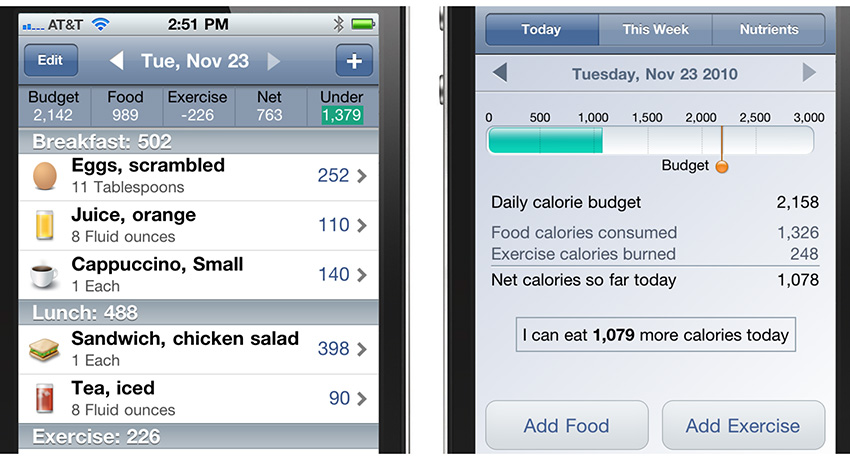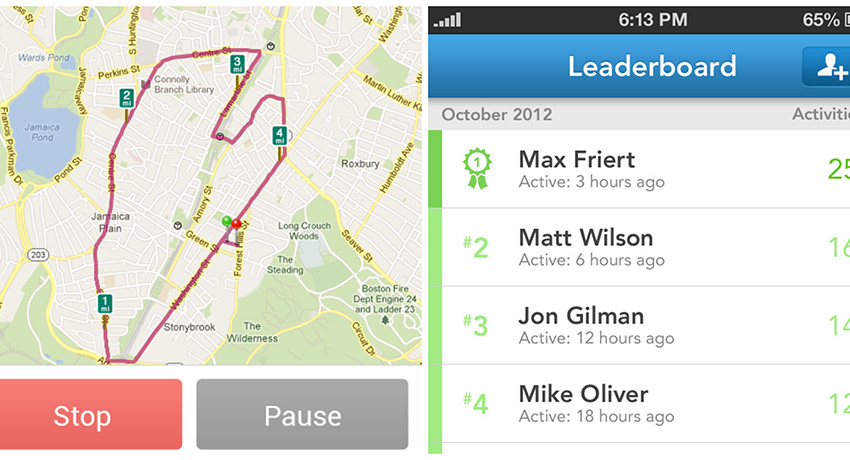Roundup: Four Local, Free Apps That Are All About Health
Four Massachusetts-based apps are helping users eat healthier, lose weight, and get fit. These apps are all free and can be quite effective, according to Boston University exercise physiology lecturer Maria Burgess. The key to the apps is that they encourage record keeping and social interaction, Burgess says.
1. Lose It!
Boston-based Lose It! is currently sitting at number five of the top free iTunes Health & Fitness apps. Lose It! is straightforward, user-friendly, and makes it easy to input your personal stats, desired weight loss goal, and set your own plan of how to attain it. Lose It! graphs your progress giving you encouragement along the way. Enter your food intake for each meal by searching its massive database of thousands of restaurants, grocery stores, and brand name foods, or just scan the barcode of whatever you’re eating and Lose It! will pull up the nutrition information for you. The app also monitors your daily intake of fat, saturated fat, cholesterol, sodium, carbohydrates, proteins, and sugars to keep you eating healthy.
What Burgess says: There have been several studies to show that if you record any type of weight loss efforts…that you are more successful in complying with the weight loss program. The [nutrition] information is taken from the Centers for Disease Control as well as from the RDA [Registry of Dietitians]… so these are pretty sound.
2. RunKeeper
Your running coach is now portable thanks to this fitness app. Boston-based RunKeeper’s running experts crafted workouts designed to do everything from helping you lose weight to helping you train for a marathon. Track your progress personally on your phone or against your contacts and Facebook friends using its in-app “leaderboard” for extra encouragement.
What Burgess says: To have a stronger heart and better blood pressure and better cholesterol values which would be metabolic fitness, you need to exercise to do that. The goal of just losing the weight period you can accomplish by just restricting calories and not exercising, and you’re going to lose muscle mass and you’re not going to be able to maintain it as easily.
3. Bon’App
Cambridge-based Bon’App makes sticking to your personal nutrition needs easy with its mapping feature. With information about your allergies, intolerances, and preferences, Bon’App searches for restaurants in a 10 mile radius that meet your specifications. In terms of daily nutrition, the app features batteries that gauge your sugar, salt, bad fat, fiber, and protein intake by turning from green to red throughout the day as you near your limits. It’s also voice activated. Name a food and the app will tap into its database of 340,000 unique items to show you what’s in it.
What Burgess says: These apps would work well in tandem. To truly become more fit and have an overall healthier lifestyle, you need to exercise as well, so the apps really could be combined to get both fitness and nutritional information.
4. Fitivity
There’s strength in numbers with this Worcester-based fitness app. Fitivity is all about the social scene by encouraging you to get moving and burn those calories with other people. Find groups in your area through the app, or create or join a pickup game or scheduled workout, and let your friends help you stay motivated to work out.
What Burgess thinks: Research shows that compliance to any program that involves a change in behavior is best achieved when done with accountability, such as recording food intake, exercise activity, etc. However, Fitivity seems to go beyond that, in that it provides a venue to actually do the activity with others of similar activity interests.




